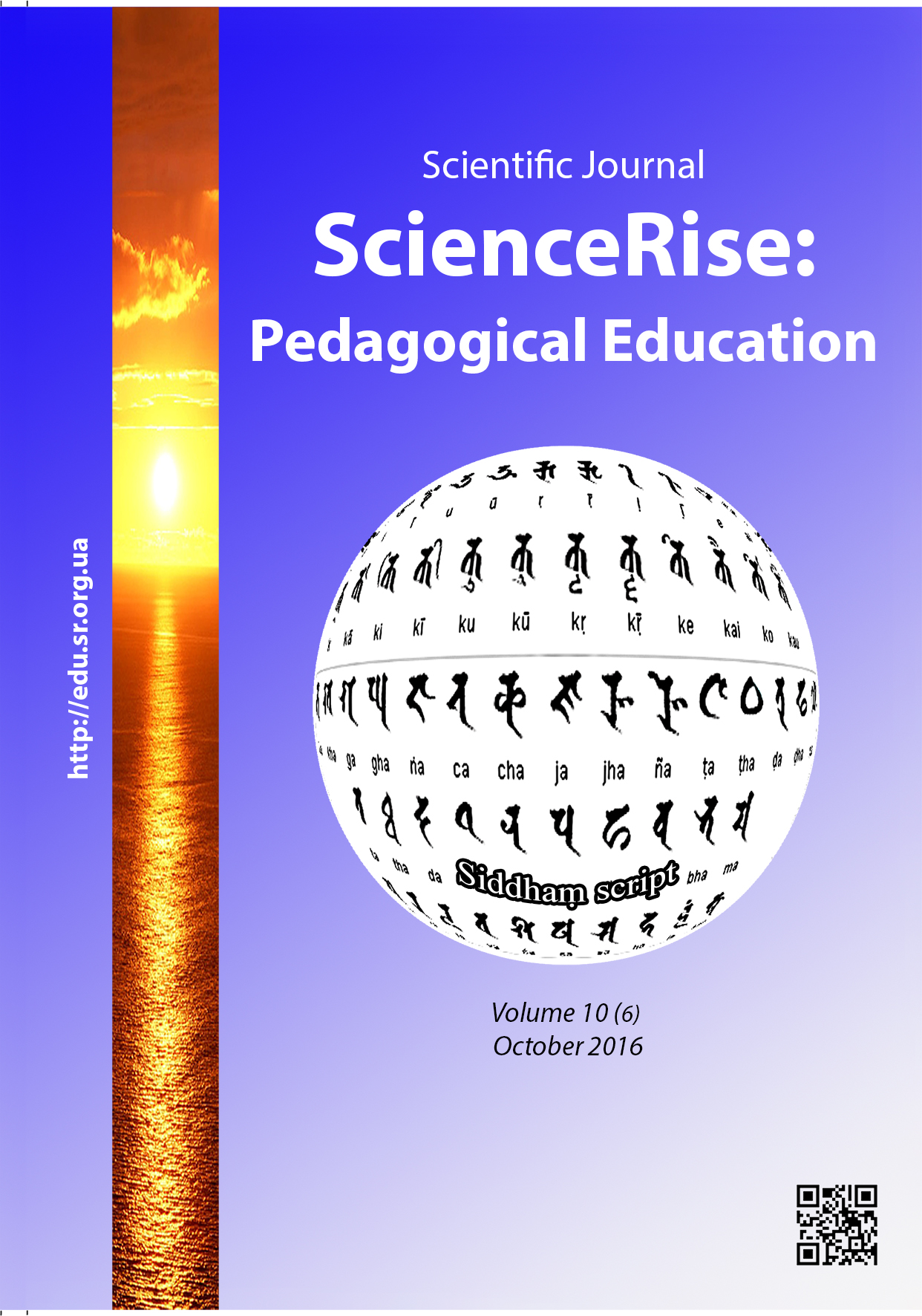The analysis of the results of experimental research of formation of the readiness to the patronage work with the elderly in students of the specialty "Social work"
DOI:
https://doi.org/10.15587/2519-4984.2016.81477Keywords:
formation of readiness, experimental research, patronage, elderly person, social workAbstract
The results of experimental research of formation of the readiness of future social workers to the patronage work with the elderly were analyzed in the article. The complex of diagnostic methods for understanding the problem of readiness of future social workers to the patronage work with the elderly was elaborated. The real state of the readiness of future social workers to the patronage work with the elderly was analyzed. The effectiveness of the content of methods, forms, methodologies of formation of the readiness of future social workers to the aforesaid type of professional activity was proved. The dynamics of establishing of the readiness of future social workers to the patronage work with the elderly was considered. The structural-functional model of the process of formation of the readiness of future social workers to the patronage work with the elderly that included interrelated structural-functional components: aim, principles, forms and methods of the work, criteria, indicators and levels of the readiness was elaborated and introduced. The socio-pedagogical conditions of formation of the readiness of future social workers to the patronage work with the elderly were revealed and grounded. It was proved, that the designed model favors the formation of the readiness to the patronage work with the elderly in students of the specialty “Social work”. The expedience of elaborated scientific-methodological support at the forming stage of experimental research was groundedReferences
- Kaps'ka, A. J., Bezpal'ko, O. V., Vajnola, R. H., Vakulenko, O. V., Karpenko, O. G. (2004). Social'na robota: tehnologichnyj aspekt. Kyiv: DCSSM, 362.
- Kolenichenko, T. I. (2010). Osoblyvosti adaptacii' ljudej pohylogo viku do umov novogo social'nogo seredovyshha. Kyiv, 220.
- Arhypova, S. P., Majboroda, G. Ja. (2002). Social'na pedagogika. Cherkasy-Uzhgorod, 154.
- Vajnola, R. H. (2009). Pedagogichni zasady osobystisnogo rozvytku majbutn'ogo social'nogo pedagoga v procesi profesijnoi' pidgotovky. Kyiv, 542.
- Karpenko, O. G.; Harchenko, S. Ja. (Ed.) (2007). Profesijna pidgotovka social'nyh pracivnykiv v umovah universytets'koi' osvity: naukovo- metodychnyj ta organizacijno-tehnologichnyj aspekty. Drogobych: Kolo, 374.
- Kozubovs'ka, I. V., Dosin, A. R. (2008). Vykorystannja dosvidu Velykoi' Brytanii' u praktychnij pidgotovci fahivciv social'noi' roboty v Ukrai'ni. Pedagogichna nauka: istorija, teorija, praktyka, tendencii' rozvytku, 1. Available at: http://intellect-invest.org.ua/pedagog_editions_e-magazine_pedagogical_science_arhiv_pn_n1_2008_st_29/
- Mishhyk, L. I. (1997). Teoretyko-metodychni osnovy profesijnoi' pidgotovky social'nogo pedagoga u zakladah vyshhoi' osvity. Zaporizhzhja, 359.
- Poltavec', V. (2000). Social'na robota v Ukrai'ni: pershi kroky. Kyiv: Vyd. dim «KM Akademija», 233.
- Aleksjuk, A. M., Beh, I. D., Demkiv, T. F., Jermakov, I. G., Zavads'kyj, I. O.; Sazonenko, G. S. (Ed.) (2000). Perspektyvni osvitni tehnologii'. Kyiv: Gopak, 560.
- Zjazjun, I. A.; Nychkalo, N. G. (Ed.) (2004). Nychkalo Nellja Grygorivna. Proftehosvita Ukrai'ny: XX stolittja. Kyiv, 694–695.
- Sysojeva, S. O., Krystopchuk, T. Je. (2009). Pedagogichnyj eksperyment u naukovyh doslidzhennjah neperervnoi' profesijnoi' osvity. Luc'k: VAT «Volyns'ka oblasna drukarnja», 460.
- Golubenko, T. O. (2015). Formuvannja gotovnosti majbutnih social'nyh pracivnykiv do patronazhnoi' roboty z ljud'my pohylogo viku. Kyiv, 227.
Downloads
Published
How to Cite
Issue
Section
License
Copyright (c) 2016 Tetiana Golubenko

This work is licensed under a Creative Commons Attribution 4.0 International License.
Our journal abides by the Creative Commons CC BY copyright rights and permissions for open access journals.
Authors, who are published in this journal, agree to the following conditions:
1. The authors reserve the right to authorship of the work and pass the first publication right of this work to the journal under the terms of a Creative Commons CC BY, which allows others to freely distribute the published research with the obligatory reference to the authors of the original work and the first publication of the work in this journal.
2. The authors have the right to conclude separate supplement agreements that relate to non-exclusive work distribution in the form in which it has been published by the journal (for example, to upload the work to the online storage of the journal or publish it as part of a monograph), provided that the reference to the first publication of the work in this journal is included.







